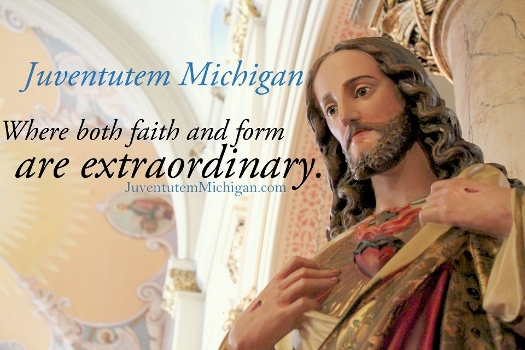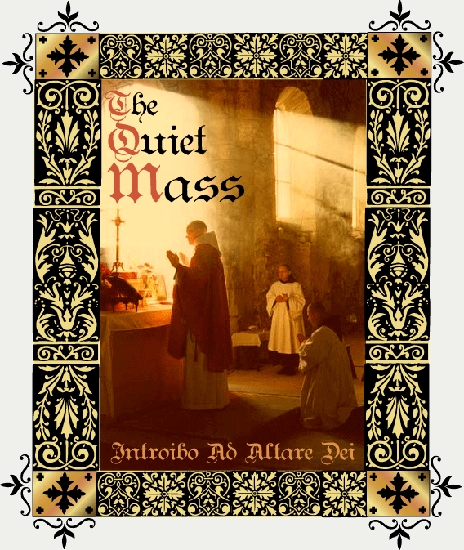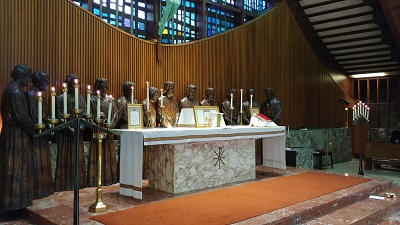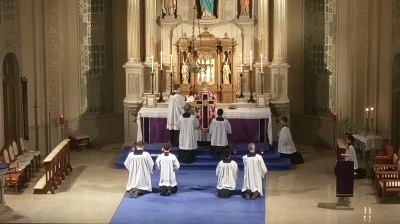
"I will go in unto the Altar of God
To God, Who giveth joy to my youth"
Tridentine Community News by Alex Begin (September 23, 2018):

September 23, 2018 – Eighteenth Sunday After Pentecost
The Principal Liturgical Books for a Church
A reader asked for a list of the principal liturgical books for the Extraordinary Form. The answer can be provided from two perspectives, that of a church and that of an individual faithful Catholic. Let’s start with the church first: A priest or church needs to be prepared to celebrate the sacraments and offer blessings, thus the following will be needed:
Altar Missals: The single most important book to have on hand is the missal for use at the altar. Since Rome instructs us to follow the 1962 rubrics, the best options are the Roman Catholic Books, Angelus Press/Benizger, and Vatican Press missals, all three of which are available new. In addition to a regular full-size altar missal, a smaller travel-size missal might be useful. Because Requiem Masses have substantially different texts from regular Masses, a Requiem Missal is also useful to have. Travel and Requiem missals are available from Fraternity Publications.
Roman Ritual: Summórum Pontíficum gave priests permission to use the traditional Roman Ritual, which has far more relevant, concise, and powerfully worded blessings than the Ordinary Form Book of Blessings. A church should have two editions: 1) The three volume Rituále Romanum edited by Weller, for a complete set of Latin prayers, and 2) The New Sanctuary Manual by Roman Catholic Books for liturgically-approved English in Baptism, the Nuptial Rite, and certain other rituals. The English supplied in the Weller books is informally translated and not approved for liturgical use, whereas The New Sanctuary Manual is not as complete as the Weller, thus both editions are necessary.
Breviary: Clerics and religious are obligated to pray at least some of the hours of the Divine Office every day. The best choice nowadays is the 1961 Roman Breviary published by Baronius Press, as it includes liturgically-approved English as well as Latin. Other options are the 1963 bilingual Monastic Diurnal and the 1961 Latin Diurnále Románum. The Principal Liturgical Books for Individuals
A similar list can be provided of the principal liturgical books that an individual Catholic layperson would find useful:
Hand Missal: The pros and cons of various hand missals have been discussed in detail in previous columns: A review of the various missals for adults was published in our April 8, 2012 column. A list of missals for children was in our February 5, 2017 column. Both are available on the web site listed at the bottom of this page.
Prayer Books: The most comprehensive collection of traditionally worded prayers is the Blessed Sacrament Prayerbook, reviewed in our November 6, 2011 column. To assist the souls in Purgatory, Catholics should also have the 2006 English Manual of Indulgences, available from the USCCB, and/or the 2004 Latin Enchirídion Indulgentiárum, available from the Vatican publishing house, Libreria Editrice Vaticana.
Roman Ritual: If a person is sick or dying, or if a specialized blessing is needed, nowadays the best way of ensuring that a priest will be able to use the Extraordinary Form version of a given formula is to have a copy of the three volume Weller Rituále Románum at your home. Consider how important having access to the texts of the Sacrament of Extreme Unction or the Rite of Holy Communion [for the sick] might be in a time of need. Having a Rituále on hand is arguably cheap insurance to pave the way to heaven.
Life in Little Rome in Washington, DC
Our May 30, 2010 column included a description of the intensely Catholic neighborhood surrounding Wyandotte’s Our Lady of the Scapular Church. Public displays of faith abound, with a “Rosary Walk” of wayside shrines having been built in 2003 near the church, resembling the abundant devotional shrines lining roads in Bavaria.
Aurora Griffin, who came to fame in 2016 via her book, How I Stayed Catholic at Harvard, has since moved on to live in Brookland, the neighborhood of Washington, DC surrounding the Catholic University of America. She, too, has discovered a rich Catholic life in that enclave, which she dubs Little Rome. Several religious communities including the Dominicans have houses in the area, which is dominated by the massive Basilica of the National Shrine of the Immaculate Conception. Her brief article is an interesting glimpse into the notion of a truly Catholic city: https://www.catholicworldreport.com/2017/12/19/life-in-little-rome-in-the-heart-of-washington-d-c/
Flint Tridentine Mass Temporary Relocation
Starting next Sunday, September 30 and for approximately 6-8 weeks to follow, the Tridentine Mass in Flint, Michigan will be celebrated at St. John Vianney Church, 2415 Bagley St. in Flint. St. Matthew Church, where the Mass is usually held, will be closed during this period while a new tile floor is installed.
Altar Server Training at Our Lady of the Scapular
Next Saturday, September 29 at 9:00 AM at Our Lady of the Scapular Church in Wyandotte, there will a training session for those interested in serving at the altar for the Traditional Mass. The class is open to those from any Latin Mass site.
Tridentine Masses This Coming Week
- Tue. 09/25 7:00 PM: Low Requiem Mass at Holy Name of Mary, Windsor (Daily Mass for the Dead)
- Sat. 09/29 8:30 AM: Low Mass at Miles Christi (Dedication of St. Michael the Archangel)
- Sat. 09/29 5:30 PM: High Mass at Old St. Mary’s (Nineteenth Sunday After Pentecost) – Fulfills Sunday obligation. Celebrant: Fr. Cy Whitaker, SJ




 NOR readers will be familiar with the stark reality that much of Europe is no longer Christian. That goes, too, for the eldest daughter of the Church, France, which boasts hundreds of renowned Gothic churches visited by the thousands each week, most not for purposes of religion. Think Notre Dame in Paris, or the cathedrals in Chartres, Rheims, Amiens, Strasbourg, and Beauvais. The list goes on and on. If only these churches were still honest representatives of a Catholic culture in France. If only that culture were as strong as the flying buttresses of its sacred houses. Alas, each of these cathedrals at this point in its history is little more than a monument to times past, a sepulcher for a once-flourishing religion and way of life. It is instructive to note that only 1.7 percent of Catholics regularly attend Mass in France — and according to Guillaume Cuchet, a professor at the University of Paris-Est Créteil who specializes in contemporary Church history, “regularly” isn’t even defined as meeting the Sunday obligation; it merely means “at least once a month.” Thousands of old French churches are no longer active places of worship; priests often have the care of 20 to 30 parishes and only celebrate regional Masses each week — and even those are attended by few. When Catholics die in France, chances are slim that a priest will be around to bury them.
NOR readers will be familiar with the stark reality that much of Europe is no longer Christian. That goes, too, for the eldest daughter of the Church, France, which boasts hundreds of renowned Gothic churches visited by the thousands each week, most not for purposes of religion. Think Notre Dame in Paris, or the cathedrals in Chartres, Rheims, Amiens, Strasbourg, and Beauvais. The list goes on and on. If only these churches were still honest representatives of a Catholic culture in France. If only that culture were as strong as the flying buttresses of its sacred houses. Alas, each of these cathedrals at this point in its history is little more than a monument to times past, a sepulcher for a once-flourishing religion and way of life. It is instructive to note that only 1.7 percent of Catholics regularly attend Mass in France — and according to Guillaume Cuchet, a professor at the University of Paris-Est Créteil who specializes in contemporary Church history, “regularly” isn’t even defined as meeting the Sunday obligation; it merely means “at least once a month.” Thousands of old French churches are no longer active places of worship; priests often have the care of 20 to 30 parishes and only celebrate regional Masses each week — and even those are attended by few. When Catholics die in France, chances are slim that a priest will be around to bury them.


